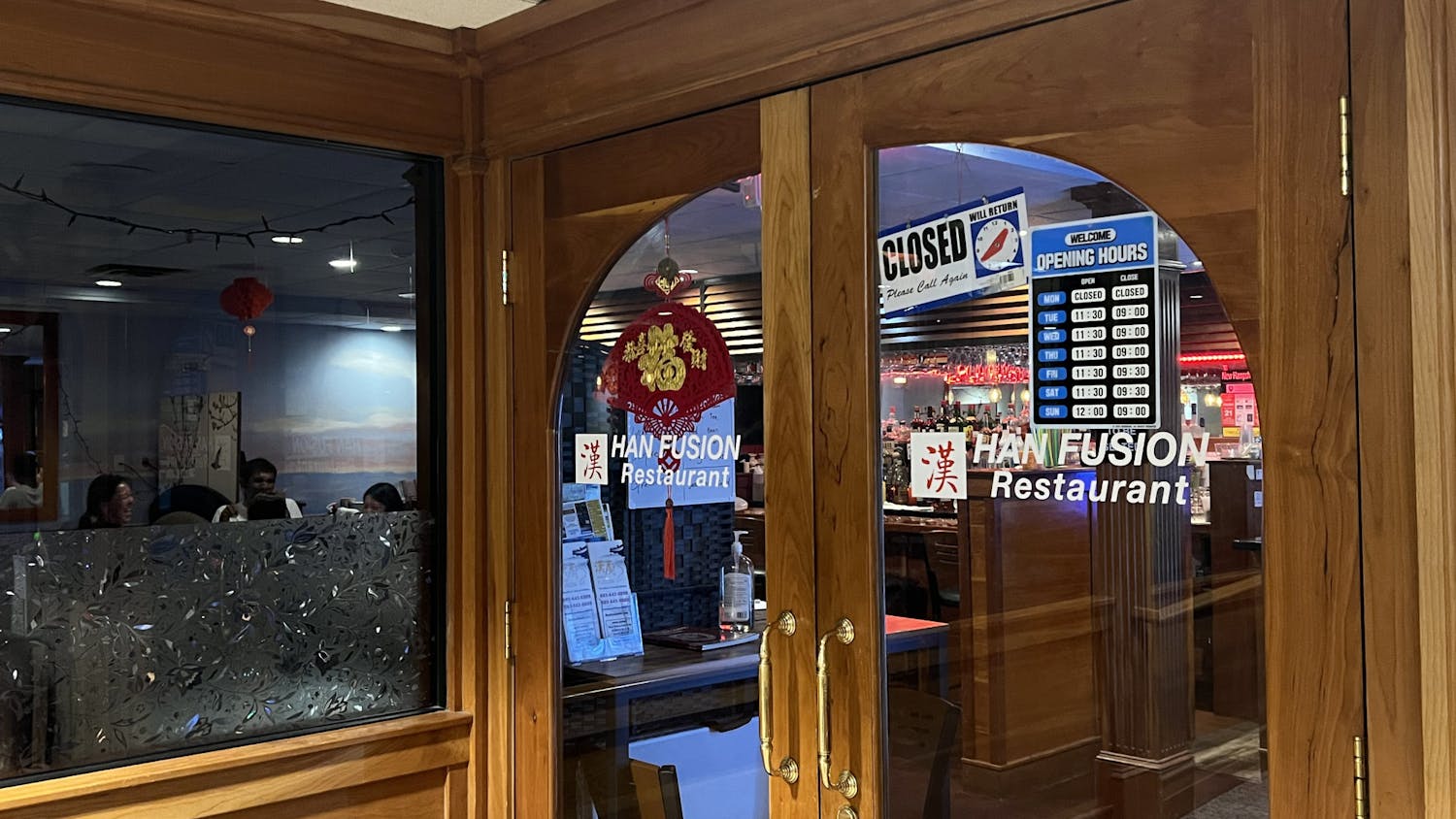CC: Less than a minute left on the clock. My fellow agent Carolyn and I scramble to input the final calculations into the calculator. If we’ve done things correctly, our final answer will be the passcode to unlock the door and escape before the bomb detonates.
CZ: Cristian has his phone in his hand, attempting to punch in the numbers into his calculator. I’m ready at the door, hand hovering at the key pad, waiting for him to relay the answer.
I type an incorrect integer. I must reset the calculator. The ticking clock fills the room.
I press the multiplication key instead of the subtraction key. I must reset the calculator again. The clock. The ticking.
On the third try, my trembling fingers don’t make any mistakes. I can feel my heart pounding in my chest. I carefully transfer our answer to the exit door’s keypad.
CC: We feel the tension dissipate from the air as she presses down on the unlock button.
Nothing happens. Our eyes dart from each other to the timer on the opposite end of the room, and everything blurs. Thirteen seconds. Our last thoughts before everything disappears: We were 13 seconds too late.
Of course, instead of a literal explosion, our demise comes in the form of an employee walking into the room and telling us that we had just gone over the time limit. He feels some sympathy for us; we leave the building with “I escaped!” bumper stickers in hand. We leave with some shame, too.
This past weekend, my fellow Mirrorwriter Carolyn Zhou and I went to Granite State Escape in Manchester, New Hampshire. The typical escape room experience is as follows: a small group (from my past experiences, usually around six people) is taken to a room and debriefed on the mission — while the theme of the room varies, the primary objective is always to unlock the final door and escape. Afterwards, the timer begins counting down (usually from 60 minutes), and it’s up to the group to investigate every corner of the room to find clues that will bring them closer to victory.
Important to note: as a safety precaution, the entrance door is always left unlocked, so someone can always leave the room for any reason if needed.
CZ: Another thing to note: Usually, brain power is all you need to rely on — the way to escape almost never requires any sort of brute force. We were warned before we started to not break anything, to avoid trying to touch the ceiling, and to not ingest the substances in the room. Apparently, these seemingly common sense rules had appeared ad-hoc over the years as various groups of individuals came and went. The puzzles can include calculations, ciphers, riddles and pattern detecting. It’s usually helpful to have a little general knowledge, but it’s not necessary. For example, at one point, we had to convert from Celcius to Farenheit. Cristian and I struggled to remember seventh grade science class for a bit but luckily found a neat chart with the equation later on.
CC: With a few exceptions that are explicitly mentioned beforehand, it’s fair game to inspect everything in the room: furniture, books and even trash cans. Sometimes one will find a key that unlocks a drawer which could contain another locked box. It’s possible that puzzles will include invisible ink that can only be seen with an ultraviolet flashlight, or maybe the light switch itself is concealed behind a locked encasement. Some clues are multi-part, and it’s the group’s responsibility to find all of the pieces before they can combine them and move forward. Because of the multi-part nature of the clues, it’s often possible to be solving multipe riddles at once. And then, some escape rooms actually consist of multiple rooms; just when the door seems to open far too easily, a group may find that the challenge has only begun.
The theme of the escape room that Carolyn and I went to was “Defuse the Bomb.” As the Granite State Escape’s website details, “There has been a recent theft at a local U.S. Army base, including two chemical bombs. As agents in the Department of Homeland Security, you have received a tip from a familiar source known only as The Chemist. Extensive research and valuable intel has led you to The Chemist’s laboratory. Upon entry, the door is sealed behind you and the entire room is wired to blow. Not only must you escape, but you must defuse the bomb first!
As we entered the room, we were both nervous — Carolyn had never done an escape room before, and while I had been to a couple this summer, each escape room has a unique set of challenges. The room itself only has a 25 percent success rate, and, to make matters worse, the room has a recommended group size of four and a maximum size of six. But it was just Carolyn and me — the two of us against the world.
Thankfully, we were able to ask for help if needed. As Nico, an employee lifeline explained, we would be given a walkie-talkie that would allow us to ask him for clues if we were ever stuck. We would also be video monitored while in the room, so if he sensed that we were almost on the right track, he could give us a nudge in the direction of the answer even if we didn’t specifically request him to.
To our relief, calling Nico for a clue would not penalize us with a time deduction, and we could ask him for as many as we needed (at other escape rooms I’ve been to, that was not always the case).
So, determined to escape despite the odds, we adopted our Homeland Security agent personas and walked in the room.
As a courtesy to Granite Room Escape, and to avoid spoiling the room for anyone interested, I can’t go into detail about the specific puzzles in the “Defuse the Bomb” room, but I can talk about my experience while inside.
The room was more difficult than we were expecting, and Carolyn and I spent a great deal of time in the beginning trying to determine where to start.
As a team, we complemented each other nicely — we often split up to search for clues, and then when a puzzle required us to count or perform some kind of calculation, we always checked each other’s work, a fact I reflect on, considering those final thirteen seconds after our metaphorical deaths. Was it a waste of time?
CZ: If there is no penalty, keep trying every possible combination you can think of. At one point, we had to enter a password into a computer. After trying to think of all the synonyms of a word, and failing, I was about to give up, but Cristian took over, and tried a different version of the word I was thinking of. Even if you split up the work, if you are stumped, have your partner look at it! He or she can often bring in a new perspective because he or she has noticed different things than you. I also think that it’s always better to have more people on your team. I think six might be a bit excessive for the room that we tried, given that it was a pretty small space, and it was easy to keep track of each other’s movements, but I think a team of three or four would be ideal.
CC: Carolyn was much more eager to ask for clues; perhaps because of my own pride, I was always hesitant to request Nico’s help, even when we had been at a standstill for several minutes. But it’s scarily easy to lose track of time while in the escape room. While Carolyn and I divided the work to be more efficient, some of the more time consuming puzzles took much longer than we had hoped. Even more frustrating was knowing that we had almost figured out one of the challenges, but there was one element we were still missing. And, in true escape room fashion, we always ended up finding what we needed right under our noses. It’s hard to say exactly where we went wrong.
CZ: I think I felt more comfortable asking for help because I am a novice. Als obecause we could ask for as many hints as we wanted, I felt like it was better if we asked for help when stumped. We only ended up asking for two hints, but those hints were valuable because we had missed something really obvious. Although we did a pretty good job, I’m not sure if either of us is cut out to be an agent with the task of saving the world. Then again, since when do you have exactly an hour to do that?!
CC: Carolyn and I ended up escaping the room 13 seconds past the hour. Nico gave us the benefit of the doubt: he had taken too long to give us clues, so he must have wasted those seconds himself. Alternatively, he might have just been protecting my pride.
If we were real Homeland Security agents, we would have been blown to smithereens and let the nefarious Chemist get away. But we’re not real Homeland Security agents, and though the situation felt real, I reconcile our deaths with the fact that we were doing a room with two of the recommended six people. Guess it’s not too popular, but even so, I highly recommend.



